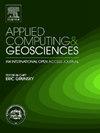Evaluating reservoir permeability from core data: Leveraging boosting techniques and ANN for heterogeneous reservoirs
IF 3.2
Q2 COMPUTER SCIENCE, INTERDISCIPLINARY APPLICATIONS
引用次数: 0
Abstract
Characterizing reservoir rock is aided by an understanding of how the permeability changes dynamically within formations. There are currently only nine research articles that focus on permeability prediction using a small set of input parameters that are easily, affordably, and frequently derived from laboratory core analysis. The majority of machine learning models applied to permeability determination are connected to well logs. This work investigates and implements four novel approaches for permeability prediction from standard core analysis data. These approaches include hybrid stacking and three boosting techniques: AdaBoost, gradient boosting, and extreme gradient boosting (XGB). While boosting enhances any regressor or classifier by being computationally efficient in large-scale datasets, stacking increases prediction accuracy by mixing the output from several base models. The dataset comprises measures of porosity (), grain density (), water saturation (), oil saturation (), depth, and absolute permeability () for 197 core plugs from the sedimentary basin of Jeanne d'Arc. According to the results, boosting strategies with a root mean squared error (RMSE) of less than 32.24 and a coefficient of determination (R2) of more than 0.95 are good enough and meet the study's objectives. With an RMSE of 23.45–30.16 and an R2 of 0.92–0.95, hybrid stacking—which combines AdaBoost, gradient boosting, XGB, and artificial neural networks (ANN)— offers a bit less accuracy than boosting models. Gradient Boosting is shown to provide the maximum precision, with an RMSE of 18.23 and an R2 of 0.98. The ANN has also high prediction accuracy, with an R2 of 0.97 and an RMSE of 26.41. The boosting strategies in permeability prediction from routine core data are quite accurate, as shown by the comparison of the suggested methodology with 20 earlier utilized models identified in 9 literatures. XGB, Gradient Boosting, AdaBoost, and Stacking models are explored in this study, marking the first instance of their application in predicting permeability from routine core analysis. Additionally, previously utilized algorithms, such as ANN, have also been re-evaluated to predict permeability. All proposed algorithms are systematically ranked based on performance criteria. The models developed in this research, leveraging a few key inputs, offer engineers and scientists a reliable and efficient means of determining reservoir permeability with high accuracy. This significantly reduces the reliance on resource-intensive and time-consuming laboratory analyses.
利用岩心数据评估储层渗透率:利用增强技术和非均质储层神经网络
了解地层内渗透率的动态变化有助于表征储层岩石。目前只有9篇研究文章关注渗透率预测,使用一组简单、经济且经常从实验室岩心分析中得出的输入参数。大多数用于渗透率测定的机器学习模型都与测井数据相关联。本文研究并实现了四种利用标准岩心分析数据进行渗透率预测的新方法。这些方法包括混合叠加和三种增强技术:AdaBoost、梯度增强和极限梯度增强(XGB)。boost通过在大规模数据集中提高计算效率来增强任何回归器或分类器,而stacking通过混合几个基本模型的输出来提高预测精度。该数据集包括孔隙度(∅)、颗粒密度(ρgr)、含水饱和度(SW)、含油饱和度(SO)、深度和绝对渗透率(K)的测量,这些数据来自Jeanne d’arc沉积盆地的197个岩心塞。结果表明,均方根误差(RMSE)小于32.24,决定系数(R2)大于0.95的提升策略足够好,满足研究目标。混合堆叠的RMSE为23.45-30.16,R2为0.92-0.95,它结合了AdaBoost、梯度增强、XGB和人工神经网络(ANN),其准确性略低于增强模型。梯度增强显示提供最大的精度,RMSE为18.23,R2为0.98。人工神经网络的预测精度也很高,R2为0.97,RMSE为26.41。将本文提出的方法与9篇文献中已有的20个模型进行了比较,结果表明,利用常规岩心数据预测渗透率的提高策略是非常准确的。本研究探索了XGB、Gradient Boosting、AdaBoost和Stacking模型,标志着它们首次应用于常规岩心分析预测渗透率。此外,以前使用的算法,如人工神经网络,也被重新评估,以预测渗透率。所有提出的算法都基于性能标准进行系统排名。本研究中开发的模型利用了几个关键输入,为工程师和科学家提供了一种可靠、高效、高精度地确定储层渗透率的方法。这大大减少了对资源密集和耗时的实验室分析的依赖。
本文章由计算机程序翻译,如有差异,请以英文原文为准。
求助全文
约1分钟内获得全文
求助全文
来源期刊

Applied Computing and Geosciences
Computer Science-General Computer Science
CiteScore
5.50
自引率
0.00%
发文量
23
审稿时长
5 weeks
 求助内容:
求助内容: 应助结果提醒方式:
应助结果提醒方式:


